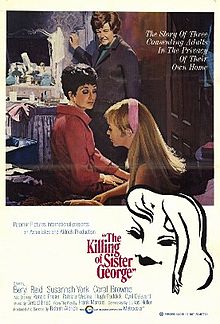
THE KILLING OF SISTER GEORGE
US, 1969, 118 minutes, Colour.
Beryl Reid, Susannah York, Coral Browne, Ronald Fraser, Patricia Medina, Hugh Paddick.
Directed by Robert Aldrich.
The Killing of Sister George was one of the first mainstream, English language films treating the theme of lesbianism. The film was based on a successful play by Frank Marcus with Beryl Reid repeating her successful stage role as the ageing actress, about to be axed from a TV series, Sister George. She gives a vigorous performance of a lonely old, woman, pathetic and bitchy, struggling to hold onto her professional life as well as her personal life. The film does not so much provide insight into Sister George as to display the range of emotions that she experienced.
Susannah York is attractive as her young companion. Coral Browne has a very good role as the sophisticated and somewhat sinister BBC producer. There is an interesting supporting cast led by Ronald Fraser and Patricia Medina. The film has a London background of the '60s and has much of the atmosphere of the BBC. There are amusing inserts of the soap opera in which George performs scattered throughout the film as well as glimpses of the making of the series.
Direction is by Robert Aldrich, usually an action director (The Dirty Dozen) who made a number of rather strident but successful films focusing on women: Whatever Happened to Baby Jane, Hush, Hush Sweet Charlotte, The Legend of Lilah Clare.
1. Interesting and entertaining? The first main English-speaking film to consider lesbian themes? of the '60s? in retrospect?
2. The basis of the screenplay in a play, the transition from stage to screen? The reliance on strong dialogue? Stage scenes? The opening out of the play? issues, characters and their clash? The critics of the film, that it vas florid, old-fashioned? How valid?
3. The atmosphere of England, London, flats, the BBC, the lesbian bars etc.? The black and white episodes from the television series? The colour photography, the strong colours and garish tones? Light and dark? Drama set in interiors? The contrasts between close-ups and groups? the musical score and the reflection of the characters?
4. Audience response to the characters as persons, as show business personalities, lesbians? Audience understanding of lesbianism, insight, the emotional response? The film's paralleling lesbian relationships with heterosexual relationships? Successfully dramatising the themes?
5. The portrait of Sister George, June Buckridge? At home, at her work, as an actress, in her relationships to those on the set, her childishness, tensions, possessiveness? How much sympathy did she evoke? A figure of pathos? Her relationship with Childie, at home, tantrums? The friendship with Betty, and going to visit her for some kind of support and comfort? The scenes at the studio: tantrums, her presumptions about her role and continuing in it, the jealousies of the cast, the script girl, the soothing over of things by the director? A nasty side of her character? Her walking out, drinking? The visit by Mrs Croft and her antagonism, her taunts, her stealing the letter, her playing up with faces to Mrs Croft and later during the final episode of the series? Her speeches, abuse? The farewell party and her speech, attack, drinking, taunting Mrs. Croft and the woman offering her the role in the children's programme? Her seeming outrageous? Her inner sadness, the toilet and her harshness? Her reaction to Alice, wanting her to come to the final filming, checking out on her employer, challenging her with her lies? The domestic antagonism? The visit to the lesbian bar, their putting on the song and dance act, their dancing together, the invitation to Mrs. Croft, her challenging both, her taking Alice away? Sister George catching Mrs. Croft and Alice together, the uproar? Her being abandoned, going to visit Betty, smashing the studio? Her final scene with her saying 'Moo' - humiliation, yet accepting the role for the children's series?
6. Susannah York's portrait of Alice? The nickname Childie? Her acting as a young girl, yet her age of 32? Her response to George, companionship, domestic scenes, acting like a child, her dolls? Her background of marriage, child, lesbian relationships? The tensions in the household? friendship with iris. Croft, showing her poetry, the opportunity of visiting the BBC, lying to George? The song and dance act at the bar? The party and her sympathy for George but alienation? George abusing her? The return with Mrs Croft? The bedroom scene (cut from many versions)? Her decision to leave, putting the key in the box? A future with Mrs Croft?
7. Mrs. Croft and her style, efficiency, self-possession, the visit to the house and handling George, her abuse and taunts, friendship with Alice? Her trying to get the role for George? Abuse and mockery? The visit to the club, the lesbian atmosphere, the party and the producer wanting George to provide the voice for the cow? Her confronting George, telling her the truth, returning to Alice, the bedroom scene, the truth about Mrs Croft, taking Alice away?
8. The studio: how a series was made, personalities and personality clashes: the director, Leo, the script girl, the cast? Discussions, strategies, backstabbing? The plan for George's death and it hurting George? The smash, the officials at the party in farewelling George?
9. The portrait of Betty and her role as a prostitute, her sympathy for, George, allowing her to weep?
10. The parallel between the collapse in George's work and in her life and relationships?
11. The strength of the dialogue, the dramatic confrontations and tensions?
12. Beryl Reid and the quality of her performance, attention-grabbing, speeches, power? Insight into human beings, relationships, lesbianism, a display or dramatics?